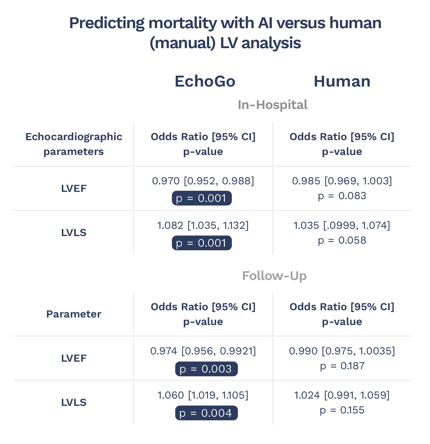
AI outperforms human analysis in predicting cardiac outcomes, research initiative by WASE finds.
- | By Ultromics
- Press Release
Ultromics’ AI technology analyzes echocardiogram images and predicts cardiac-related mortality better than human analysis.
A new study from the World Alliance Societies of Echocardiography (WASE), a major international research initiative led by the American Society of Echocardiography (ASE), says artificial intelligence (AI) is superior to human experts when it comes to predicting cardiac-related death1, a capability that could revolutionize cardiovascular care.
Ultromics is moving quickly and innovatively to help develop novel approaches to improve heart failure detection. The company recently announced a partnership with The Foundation for the National Institutes of Health (FNIH)2 that will use their upcoming FDA breakthrough designated product to improve heart failure detection3, looking specifically at heart failure with preserved ejection (HFpEF).
This latest research from WASE builds on previous work which showed that AI–based analysis could accurately detect outcomes from echocardiographic images1, including combining myocardial strain biomarkers to improve predictive accuracy, recommended as clinical best practice4. With this, an interest in the AI's ability to make outcome predictions was compared with conventional analysis by human experts.
Dr. Federico M. Asch, lead study author and Director of the Cardiovascular and Echo Core Labs at MedStar Health Research Institute, said: "AI derived results outperformed traditional manual analysis in the generation of Left Ventricular Ejection Fraction and Global Longitudinal Strain, as the AI proved to be a significant predictor of outcomes, which traditional reads by expert echocardiographers could not achieve."
The study looked at 870 patients admitted to 13 hospitals in 9 countries (Asia, Europe, United States, Latin America), who had acute COVID-19 and underwent transthoracic echocardiography.
The research was supported in partnership by MedStar Health, University of Chicago, and Ultromics. Dr. Federico Asch, Director of the Cardiovascular and Echo Core Labs at MedStar Health Research Institute, and Dr. Roberto Lang, Director of the University of Chicago's Non-invasive Cardiac Imaging Laboratory, served as principal investigators.
Echocardiographic left ventricular ejection fraction (LVEF) and left ventricular longitudinal strain (LVLS) were obtained manually by multiple expert readers and by the automated EchoGo AI platform from Ultromics. The ability of the manual and AI analyses to predict all-cause mortality was compared.
AI-derived LVEF and LVLS were predictors of mortality in univariable and multivariable regression analysis (odds ratio, 0.974 [95% CI, 0.956-0.991; P = .003] for LVEF; odds ratio, 1.060 [95% CI, 1.019-1.105; P = .004] for LVLS), but LVEF and LVLS obtained by manual analysis were not1.

Direct comparison of the predictive value of AI versus manual measurements of LVEF and LVLS showed that AI was significantly better (P = .005 and P = .003, respectively)1. In addition, AI-derived LVEF and LVLS had more significant and stronger correlations to other objective biomarkers of acute disease than manual reads. Lastly, , inter-operator agreement for LVEF and GLS was 23% and 44% (respectively) lower for manual measurements than that achieved by the AI1.
Dr Ross Upton, CEO and Founder of Ultromics, said “Developing precision strategies for cardiovascular disease is more critical than ever, particularly heart failure, where patient cases and costs are expected to double between now and 20305. We built our AI platform to improve the accuracy of heart failure detection and prevent worsening cardiac outcomes.” Upton continued: “The technology was built using deep learning, from 10 years' worth of echocardiographic images tied to outcomes, to provide precision analysis independent of expert clinicians”.
This study demonstrates the prognostic value of AI for routine primary care and improved accuracy for prediction of cardiovascular disease. Ultromics will continue to explore how AI can contribute to the development of echocardiography and preventative care.
References:
- Asch FM, Descamps T, Sarwar R, et al. Human versus Artificial Intelligence-Based Echocardiographic Analysis as a Predictor of Outcomes: An Analysis from the World Alliance Societies of Echocardiography COVID Study. Journal of the American Society of Echocardiography. 2022;35:1226-1237.e7h2
- EchoGo Heart Failure is pending FDA 510k clearance
- Karagodin I, Carvalho Singulane C, Woodward GM, et al. Echocardiographic Correlates of In-Hospital Death in Patients with Acute COVID-19 Infection: The World Alliance Societies of Echocardiography (WASE-COVID) Study. Journal of the American Society of Echocar
- Smiseth OA, Torp H, Opdahl A, Haugaa KH, Urheim S. Myocardial strain imaging: how useful is it in clinical decision making? European Heart Journal. 2015;37:1196–1207.diography. 2021;34(8):819–30.
- Savarese G and Lund LH. Global public health burden of heart failure. Cardiac Failure Review. 2017;3:1:7-11.

